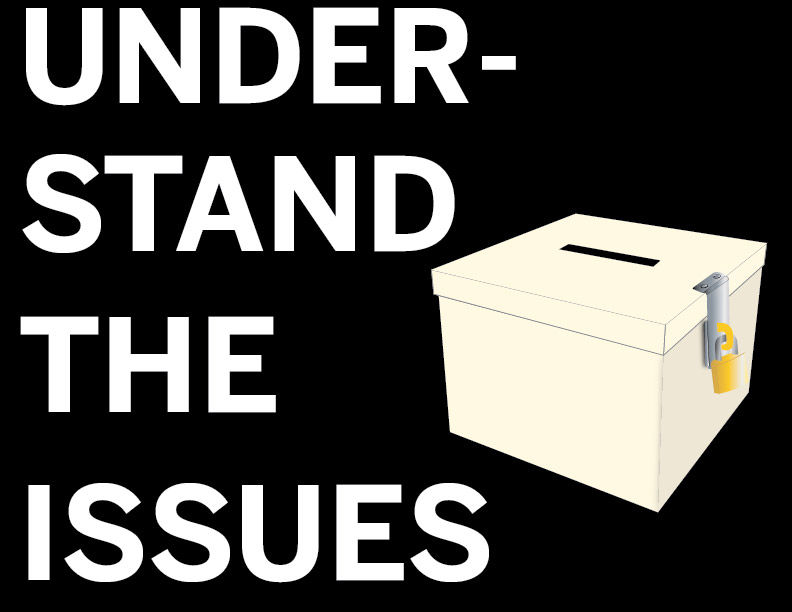Getting educated on the issues
On Tuesday, voters in Kent will head to the polls to vote on issues for both the city and the state. On the state level, the highly publicized Issues 1 and 2 talk about crime victim rights and drug price standards, respectively. Local Issues 8 and 9 deal with a bond issue to potentially build a new recreation center and the possibility of naming Kent a sanctuary city.
Issue 1(Ohio) – Crime Victim Rights Initiative
Issue 1 is designed to lay out the rights of crime victims more clearly. It would repeal and replace Ohio’s Amendment 2, which passed in 1994.
Issue 1 is designed to lay out the rights of crime victims more clearly. It would repeal and replace Ohio’s Amendment 2, which passed in 1994.
The original law requires that victims of crimes be treated with “fairness, dignity and respect” in the justice system, and requires that they be granted information about their case and reasonable protection from the perpetrator. The language of Issue 1 is more specific, adds a right to privacy, restitution and notice upon release of the accused perpetrator.
The issue is a version of Marsy’s Law, which is designed to protect victims of crimes. Critics of the law point out that it also allows the victim of a crime to refuse to testify, which could make it significantly more difficult to convict the perpetrators of crimes.
Representatives opposing the bill say it will inhibit the process of the criminal justice system.
“Issue 1 conflicts with essential guarantees in the Bill of Rights, including double jeopardy, confrontation, and speedy trial – rights fundamental to our Founders,” the official argument against Issue 1 said, which was signed by Ohio Public Defender Tim Young. “This amendment will result in increased litigation, increased costs to taxpayers, and will delay cases, only hurting victims. This amendment is wrong for Ohio.
Issue 2 (Ohio) – Drug Price Standards Initiative
Issue 2 would require state agencies like the Ohio Department of Medicaid, the Ohio HIV Drug Assistance Program and the Ohio Best RX Program to negotiate with producers of health care drugs for prices equal to or lower than the prices that those companies charge the Department of Veterans Affairs.
This initiative could potentially reduce health care costs and may save the state money by applying to state-run agencies. However, companies could respond by raising the prices they currently charge to the VA or by refusing to sell certain drugs to state-run agencies, which could leave people currently getting drugs through the state without any access to their medication at all.
This initiative is reflective of a bill unveiled in the U.S. Senate last month. A similar bill failed in California in 2016.
Representatives in favor of the bill say it will hold drug companies accountable.
“Drug companies have completely rigged the system so you pay more,” the official argument sheet in favor of Issue 2 said. “Washington, DC doesn’t negotiate fair prices with drug companies, so it’s up to the states to enact reforms. To do that we must change Ohio law and vote YES on Issue 2.”
Issue 8 (Kent)- Kent City Health and Wellness Bond
This bond hopes to approve funding for the purpose of constructing, furnishing, equipping and otherwise improving a health and wellness center by acquiring and improving sites for the center within the city. The proposed space would include 72,000 sq. ft. of gymnasium spaces, an indoor turf field, elevated walking areas, exercise equipment and other dedicated community health spaces.
The bond would be for $17.5 million to be paid over the course of 28 years. The bond would be funded through an additional property tax of 28.8 cents for each $100 of property valuation, beginning in 2017, first due in calendar year 2018. So a house with a value of $100,000 would have an additional cost of $7.43 monthly or $89.12 annually.
Those opposed to the new health center argue that this facility would be no different than the Kent State Recreational Center.
Issue 9 (Kent)– Sanctuary City Declaration
This would change language in the city’s charter to formally declare the city a sanctuary city. This means that local authorities would not cooperate with immigration officials by detaining those they suspect to be undocumented, regardless of the reason these people are suspected.
Sanctuary cities do not violate federal law by ejecting immigration officials from local boundaries as some opponents suggest; they only prevent local officials from profiling and reporting undocumented people to federal authorities.
A fear among those opposed to the sanctuary city status is the potential loss of funds for the city.
“There have been threats made by government entities that any city that participates in sanctuary city (policies), which violates the law, might be looked at unfavorably when it comes to getting funds,” said Kent city councilman John Kuhar, in a past KentWired story. “Kent gets an awful lot of funds.”
Carlyle Addy is the student politics reporter. Contact her at [email protected].



